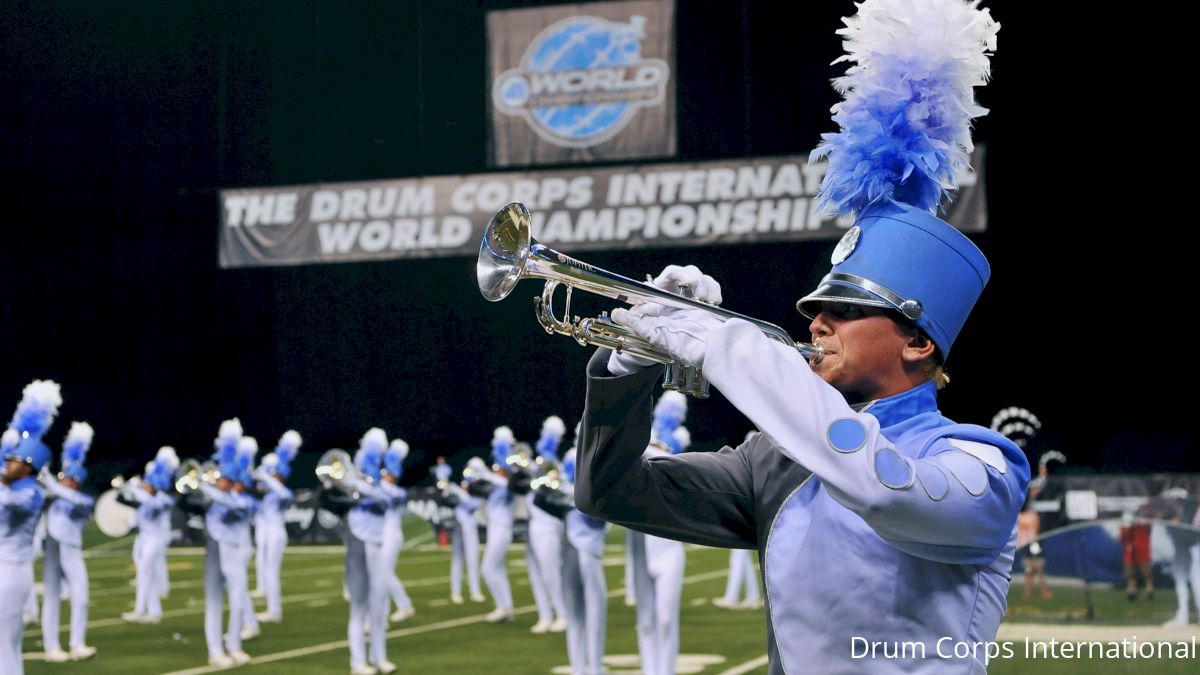BOASep 6, 2016 by Wesley Sullivan
Audition Camps: Tips for Getting Yourself Ready Mentally
Audition Camps: Tips for Getting Yourself Ready Mentally
How to get yourself ready for an audition camp with your next marching ensemble.

It seems almost surreal how quickly the WGI/DCI audition camps and "experiences" come upon us. Finals is just a few weeks in the rear view mirror, and many WGI lines have their first audition camps in September. Some have started already.
To many aspiring WGI or DCI members, the audition process can be daunting. You don't know what will happen, you don't know many people at your prospective new guard, line, or corps, and that can be a huge mental hurdle to overcome. Using our own experiences from past auditions, here are some helpful tips that will help alleviate some of the worries you may have as you make your choices about auditioning.
It's always worth a shot.
This is a running theme throughout the marching arts. Corps especially tell their current members to encourage everyone to come to at least the first audition or experience camp. This is absolutely true. What do you have to lose? Some money. A little bit of pride. But what do you stand to gain by attending a camp? A potential spot. Lifelong friendships. A weekend of education worth far more than the camp fee you pay. An overall experience that helps you grow as a performer and as an individual.
FloMarching suggests starting young. Identify what corps, guard, or line you want to end your career with. Begin auditioning for that group as soon as you can. If you don't get a spot due to age, skill level, or something else, you will walk away with a.) the knowledge of what the audition process is like for next year so you know what to expect next year; b) a repor with the staff -- they will remember you next year and make note of the improvements you made in the offseason; c) confidence. While you may thinking "if I don't make it won't that hurt my confidence in my abilities?" Confidence is based on knowledge and the more knowledge you have the more confidence you'll have as well. So while you may not walk away with the center snare spot, you definitely will come home with more knowledge than if you did not go to the camp. And that knowledge will build your confidence. Also, making the decision to audition is hard. Taking the first leap by going to the camp gets the proverbial monkey off of your back and you will return far more confident the next year.
Take a deep breath, and trust in the training you have received.
You are at an audition camp because you love the activity. Presumably, this is because an instructor or teacher or other mentor in your life has shared his or her passion with you. With that passion comes knowledge. If they have shared their passion, they have also shared their knowledge. Trust in that knowledge as you enter the audition process. You have been trained. You have a skillset. You may need to adjust that skillset slightly depending on who trained you and where you are auditioning, but you have a base level from which to move.
Taking a deep breath is important. If you let your emotions get the best of you, whether it be nerves, pride, or anything else, you lose an effective communication tool during your audition; your poise. Performance has come into a new focus in the activity, and you must have control of your emotions to perform effectively.
Michael Gilley, Sr. Editor for FloMarching and drum corps alumni, said he approached the audition with a mindset that you don't have to be perfect all camp long. You will end up psyching yourself out and be so worried about making a mistake that you will have the courage to go full-out which is what separates those top performers. Instead, understand that everyone will make mistakes. Vets included. But it will be your ability to minimize your mistakes while pushing yourself beyond your comfort zone.
"I would play a mind game with myself." Michael said. "In the beginning of the camp, when I was learning music or drill, I would try to get streaks going of being perfect at something. At first the streaks wouldn't last very long. Maybe 2 or 3 reps in a row. Or 5-10 minutes without a mistake. But as the camp progressed I would continuously try to beat my best streak. Eventually, it would get to the point where my streaks of no mistakes would be for the entire block of rehearsal or the entire day. Its based around the idea of 'How does one eat an elephant? One bite at a time'."
Work hard, learn harder.
Everyone seems to be under the impression that a ton of exceptionally talented kids audition at every single organization. That is partly true. Every section of the ensemble gets a bunch of talent each year. But not all organizations draw all of the top talent in the activity.
Here is where you can set yourself apart as a prospective member. As a former drum corps and WGI instructor, I'll tell you that work ethic always trumped talent for me. Part of it was my pedigree -- I was not the most talented snare drummer. I went to two corps where I was provided with an incredible education, and where I was taught that working hard was the best way to overcome anything. Can't play flam drags? Practice more. Can't nail that 5 double turn around? Practice more. Struggling with double tonguing? Woodshed it.
Hard work takes zero talent. Commitment takes zero talent. Showing up early takes zero talent. Showing up prepared takes only a marginal level of talent. These are all things that the staff will notice. At every marching ensemble, BOA, WGI, or DCI, what matters most to all instructors is "does this student stay eminently teachable at all times?" That is to say, can they use the educational program the group provides to mold you into a uniform vision of what they want that group to be. Arrive at the camp not prepared to show off your talent, but to show off what a good and dedicated student you are and will continue to be if you're offered a spot.
Soak in the experience.
You are doing yourself and the staff a disservice if you spend the entire weekend nervous about what is going to happen. Show up, soak in all the information you can, and soak in everything everyone says. Who knows? Your snare tech may be on his way to becoming the next Mike Stevens. Your saber tech may be the next Jay Murphy, and your mello tech may be the next Michael Terry. You just never know. This activity is filled with brilliant people, all of whom have something to teach us.
As one of my mentors is fond of saying "the moment you stop learning is the moment you should leave the activity." So regardless of if you are there for a weekend, a season, or a career, soak in everything that is happening. Who knows when it will benefit you to remember when so and so did at that audition camp back in the day? It could come in handy.
Also, many of these camps are now being branded as "experience camps" for a reason. You aren't there just to audition. You are there to truly experience everything the group has to offer. Education, culture, entertainment, comradery. If you don't soak that in, you are not getting a good return on your camp fee, and you are not getting the full experience.
Play or perform like you already have a spot.
This is another piece of advice I got from a mentor. When you appear timid, the instructors or evaluators or more likely to give you a lower score. This is not necessarily because you are not skilled. It may be because your presence is not what they are looking for. It may also be because you are so afraid that you are performing at a level lower than your own ability.
The best remedy? Play as though you are a vet in the section. Spin as though you have been there for years. Fit your confidence in with the veterans around you. You will look more confident, and therefore feel more confident. You will perform much better as a result.
There is no place for timid in this activity. Play like you're already on the team.
To many aspiring WGI or DCI members, the audition process can be daunting. You don't know what will happen, you don't know many people at your prospective new guard, line, or corps, and that can be a huge mental hurdle to overcome. Using our own experiences from past auditions, here are some helpful tips that will help alleviate some of the worries you may have as you make your choices about auditioning.
It's always worth a shot.
This is a running theme throughout the marching arts. Corps especially tell their current members to encourage everyone to come to at least the first audition or experience camp. This is absolutely true. What do you have to lose? Some money. A little bit of pride. But what do you stand to gain by attending a camp? A potential spot. Lifelong friendships. A weekend of education worth far more than the camp fee you pay. An overall experience that helps you grow as a performer and as an individual. FloMarching suggests starting young. Identify what corps, guard, or line you want to end your career with. Begin auditioning for that group as soon as you can. If you don't get a spot due to age, skill level, or something else, you will walk away with a.) the knowledge of what the audition process is like for next year so you know what to expect next year; b) a repor with the staff -- they will remember you next year and make note of the improvements you made in the offseason; c) confidence. While you may thinking "if I don't make it won't that hurt my confidence in my abilities?" Confidence is based on knowledge and the more knowledge you have the more confidence you'll have as well. So while you may not walk away with the center snare spot, you definitely will come home with more knowledge than if you did not go to the camp. And that knowledge will build your confidence. Also, making the decision to audition is hard. Taking the first leap by going to the camp gets the proverbial monkey off of your back and you will return far more confident the next year.
Take a deep breath, and trust in the training you have received.
You are at an audition camp because you love the activity. Presumably, this is because an instructor or teacher or other mentor in your life has shared his or her passion with you. With that passion comes knowledge. If they have shared their passion, they have also shared their knowledge. Trust in that knowledge as you enter the audition process. You have been trained. You have a skillset. You may need to adjust that skillset slightly depending on who trained you and where you are auditioning, but you have a base level from which to move. Taking a deep breath is important. If you let your emotions get the best of you, whether it be nerves, pride, or anything else, you lose an effective communication tool during your audition; your poise. Performance has come into a new focus in the activity, and you must have control of your emotions to perform effectively.
Michael Gilley, Sr. Editor for FloMarching and drum corps alumni, said he approached the audition with a mindset that you don't have to be perfect all camp long. You will end up psyching yourself out and be so worried about making a mistake that you will have the courage to go full-out which is what separates those top performers. Instead, understand that everyone will make mistakes. Vets included. But it will be your ability to minimize your mistakes while pushing yourself beyond your comfort zone.
"I would play a mind game with myself." Michael said. "In the beginning of the camp, when I was learning music or drill, I would try to get streaks going of being perfect at something. At first the streaks wouldn't last very long. Maybe 2 or 3 reps in a row. Or 5-10 minutes without a mistake. But as the camp progressed I would continuously try to beat my best streak. Eventually, it would get to the point where my streaks of no mistakes would be for the entire block of rehearsal or the entire day. Its based around the idea of 'How does one eat an elephant? One bite at a time'."
Work hard, learn harder.
Everyone seems to be under the impression that a ton of exceptionally talented kids audition at every single organization. That is partly true. Every section of the ensemble gets a bunch of talent each year. But not all organizations draw all of the top talent in the activity. Here is where you can set yourself apart as a prospective member. As a former drum corps and WGI instructor, I'll tell you that work ethic always trumped talent for me. Part of it was my pedigree -- I was not the most talented snare drummer. I went to two corps where I was provided with an incredible education, and where I was taught that working hard was the best way to overcome anything. Can't play flam drags? Practice more. Can't nail that 5 double turn around? Practice more. Struggling with double tonguing? Woodshed it.
Hard work takes zero talent. Commitment takes zero talent. Showing up early takes zero talent. Showing up prepared takes only a marginal level of talent. These are all things that the staff will notice. At every marching ensemble, BOA, WGI, or DCI, what matters most to all instructors is "does this student stay eminently teachable at all times?" That is to say, can they use the educational program the group provides to mold you into a uniform vision of what they want that group to be. Arrive at the camp not prepared to show off your talent, but to show off what a good and dedicated student you are and will continue to be if you're offered a spot.
Soak in the experience.
You are doing yourself and the staff a disservice if you spend the entire weekend nervous about what is going to happen. Show up, soak in all the information you can, and soak in everything everyone says. Who knows? Your snare tech may be on his way to becoming the next Mike Stevens. Your saber tech may be the next Jay Murphy, and your mello tech may be the next Michael Terry. You just never know. This activity is filled with brilliant people, all of whom have something to teach us. As one of my mentors is fond of saying "the moment you stop learning is the moment you should leave the activity." So regardless of if you are there for a weekend, a season, or a career, soak in everything that is happening. Who knows when it will benefit you to remember when so and so did at that audition camp back in the day? It could come in handy.
Also, many of these camps are now being branded as "experience camps" for a reason. You aren't there just to audition. You are there to truly experience everything the group has to offer. Education, culture, entertainment, comradery. If you don't soak that in, you are not getting a good return on your camp fee, and you are not getting the full experience.
Play or perform like you already have a spot.
This is another piece of advice I got from a mentor. When you appear timid, the instructors or evaluators or more likely to give you a lower score. This is not necessarily because you are not skilled. It may be because your presence is not what they are looking for. It may also be because you are so afraid that you are performing at a level lower than your own ability. The best remedy? Play as though you are a vet in the section. Spin as though you have been there for years. Fit your confidence in with the veterans around you. You will look more confident, and therefore feel more confident. You will perform much better as a result.
There is no place for timid in this activity. Play like you're already on the team.
Related Content
 2024 Bluecoats Opening Night Community Celebration Debuts on Flo, June 29
2024 Bluecoats Opening Night Community Celebration Debuts on Flo, June 29Mar 11, 2024
 How to Watch: 2024 Bluecoats Opening Night Community Celebration
How to Watch: 2024 Bluecoats Opening Night Community CelebrationMar 11, 2024
 How to Watch: 2024 DCI World Championship
How to Watch: 2024 DCI World ChampionshipMar 4, 2024
 How to Watch: 2024 DCI Rochester
How to Watch: 2024 DCI RochesterMar 4, 2024
 How to Watch: 2024 DCI Eastern Classic
How to Watch: 2024 DCI Eastern ClassicMar 4, 2024
 DCI 2024 Streaming Schedule: What Will Be LIVE On FloMarching This Summer
DCI 2024 Streaming Schedule: What Will Be LIVE On FloMarching This SummerMar 4, 2024
 How to Watch: 2024 Music on the March
How to Watch: 2024 Music on the MarchMar 4, 2024
 How to Watch: 2024 CrownBEAT
How to Watch: 2024 CrownBEATMar 4, 2024
 How to Watch: 2024 Midwest Premiere
How to Watch: 2024 Midwest PremiereMar 4, 2024